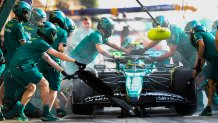What to Know
- Drivers compete for the F1 Drivers’ Championship, while the teams fight for the F1 Constructors’ Championship and prize money based on their position at the end of the season.
- Only 20 drivers get the chance to compete, and they push themselves – and their incredible machines – to the very limit.
- During a pit stop the four tires need to be changed under 2 seconds.
As the highest class of international racing for single-seater formula racing cars, Formula 1 is the pinnacle of motorsport and the world’s most prestigious motor racing competition.
Extreme G-forces. Daring decisions made in the blink of an eye – and at 370 km/h. Dramatically battling to be the best, Formula 1 drivers are more like fighter pilots than sportspeople.
Even though it might be perceived as an individual competition, F1 is a team sport and with 10 teams of two drivers.
Get a weekly recap of the latest San Francisco Bay Area housing news. Sign up for NBC Bay Area’s Housing Deconstructed newsletter.
This is going to be the longest season in the history of the sport, with as many as 24 races in 21 countries.
How many drivers and teams race in F1?
A total of 20 drivers and 10 teams makes up the current Formula 1 grid, with each outfit fielding two cars.
Sports
This season, driver experience ranges from multiple world champions Lewis Hamilton, Max Verstappen and Fernando Alonso, to racers in their second seasons such as Oscar Piastri and Logan Sargeant.
When it comes to teams, there are those who have been in F1 since the early years, such as Ferrari (competing continuously since the very first season in 1950) and McLaren, or relative newcomers like Haas, which entered the sport ahead of the 2016 season.
How long do F1 races last?
Formula 1 races generally last between an hour-and-a-half and two hours, though this can be affected by Safety Car periods that slow the field down or red flags that halt the action.
Where are the F1 races?
For the first time in history, F1, will hold 24 races during its 2024 season with 3 of those races in the United States.
Miami kicks off the American circuit with a race in May, followed by Austin in October and Las Vegas in November.
The other 21 races will take place around the globe, including in Imola, Sao Paulo and Monte Carlo. In addition to classic tracks such as Silverstone, Spa-Francorchamps and Suzuka.
This year F1 made some recent additions to the circuit roster including Qatar and China.
How does the F1 weekend work?
Each race weekend is called the Grand Prix. The standard Formula 1 weekend events take place over three days – typically Friday, Saturday and Sunday.
Friday features two 60-minute Free Practice sessions (FP1 and FP2) for teams to set up their cars. These are typically used to make sure the car works as it should, before set-up changes are made and race preparations continue.
On Saturday, after a final practice session (FP3), drivers head into a three-stage qualifying session, with the slowest five drivers from the 18-minute Q1 phase eliminated, before five more go out of the 15-minute Q2 segment. That sets positions 20-11 on the grid prior to any penalties. A final 12-minute-long Q3 then decides the top 10 grid slots, along with the coveted pole position for the fastest driver.
Sunday brings the race itself, where drivers battle it out to score points and grab the highest spot on the podium.

How does Formula 1 scoring work?
If you're new to Formula 1, you might be wondering how the scoring system works and how the championships are decided. Here is a breakdown of how points are awarded in F1 races and sprints.
In regular races, only the top 10 drivers can get points - with the winner receiving 25 points, second place receiving 18 points and the third place driver receiving 15 points.
The number of points decreases by two points for each position down until the 10th, which is worth just a single point. Those drivers who finish outside the top 10 will not score points.
In sprint races, drivers race 100 kilometers in 25 or 30 minutes race.
The top eight finishers receive points - the winner gets eight points, second place gets seven, and the third place driver receives six points.
How do F1 cars work?
Thousands of parts are involved in creating some of the fastest and most advanced racing cars on the planet – spanning detailed bodywork, suspension elements, turbo-hybrid power units, eight-speed paddle shift gearboxes, 18-inch tires and much more.
When the engine powers it forward, an F1 car essentially acts as an airplane flipped upside down, with front and rear wings – and everything in between – pushing the car down onto the track and giving it incredible levels of grip through corners.
That said, F1’s current technical regulations are based around a "ground effect" aerodynamic concept, with several carefully designed tunnels underneath the car’s floor sucking the car to the track surface to generate even more downforce.
This, combined with simpler bodywork than previous years, means less "dirty air" – or disrupted airflow – is created and allows cars to follow each other more closely, opening up additional overtaking opportunities and adding to the on-track spectacle.
What are F1 cars powered by?
F1 cars are powered by turbocharged V6, 15,000 RPM engines, featuring kinetic and thermal energy recovery systems that together create the ‘power unit.’
Today’s F1 power units comprise the following elements: the internal combustion engine (ICE), motor generator unit-heat (MGU-H), motor generator unit-kinetic (MGU-K), turbocharger, energy store (ES), control electronics (CE) and exhaust.
How to watch F1?
Formula 1 racing returns to ESPN platforms for the 2024 season.
The season begins March 2, and you can watch every Grand Prix this season on ABC, ESPN and ESPN2. Formula One offers F1 TV at a low monthly cost.
Formula 1 is renowned for the intense rivalries between teams, which adds excitement and drama to the sport. These rivalries are usually fueled by competition for championships and individual driver rivalries, creating compelling narratives that capture the attention of fans and generate interest.



